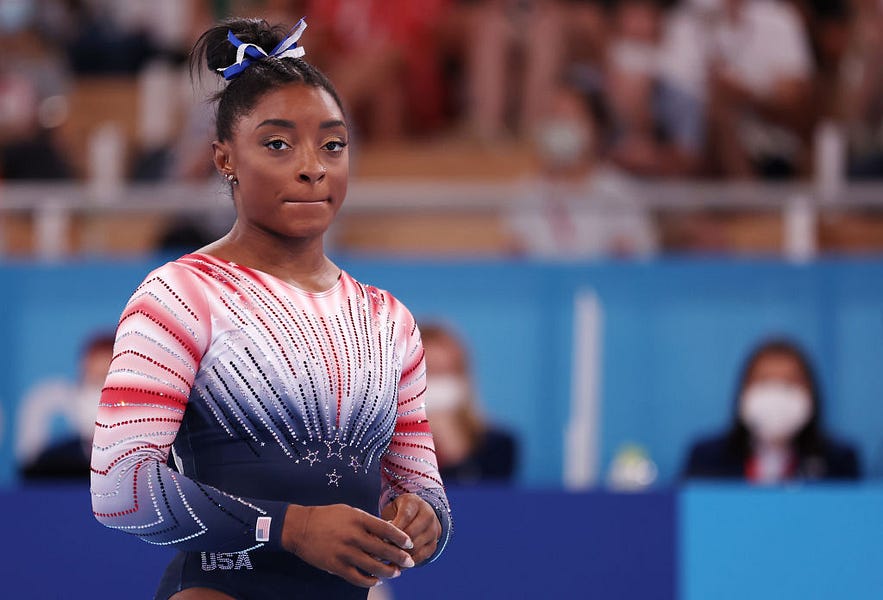Before the Olympic Games began, it would have been hard to imagine Simone Biles winning only a silver and a bronze and calling it a successful games. She’s widely considered the best gymnast of all time and has 32 Olympic and World Championship medals to her name. But her time in Tokyo was an unparalleled success. Her decision to withdraw from all events, save the balance beam, because she did not think her state of mind allowed her to compete safely has been a victory for her—and for others.
Biles was able to use her fame and prestige to have an impact that a lesser athlete would not have. But crucial for Biles is that she got help along the way in her defiance of sports norms. She was not, as she might have been in past years, accused of choking under pressure.
It’s fair to say that Biles’ benefitted at least somewhat from good timing. Her decision not to compete in the team finals came not long after Naomi Osaka, the two-time U.S. Open tennis champion, dropped out of the French Open citing pressure and concerns over her mental health. Osaka faced an initial backlash but drew mostly positive support, especially from other high-level athletes. And in Tokyo, Biles’ teammates supported her and welcomed her as a cheerleader.
What Biles has achieved with her actions is far more than standing up for herself. She has by her example helped erode the distinction between physical and mental health in sports. She has shown how both are crucial for an athlete and that there are no grounds for regarding a physical reason for exiting competition as honorable and a psychological reason as a lapse in character.
In taking the steps she did, Biles has made a frontal assault on the ideal of the athlete as a hero who will sacrifice everything to win rather than someone who has perspective. There could not be greater contrast in images, as New York Times sports reporter Kurt Streeter has pointed out, than the one between Biles and former gymnast Kerri Strug (who publicly supported Biles’ decision), who in the 1996 Olympics competed on the vault in such pain from an ankle injury that at the conclusion of her final vault she could not stand on her own and had to be carried by her coach to receive her gold medal in the women’s team competition..
Biles has obliterated the notion that the best way to get a winning performance from female athletes is for them to be coached and managed by no-nonsense men. Even before the Olympics, Biles challenged that idea by her criticism of the way USA Gymnastics failed to protect her and other gymnasts from sexual abuse at the hands of team doctor Larry Nasser. “I too am one of the many survivors that was sexually abused by Larry Nassar,” Biles tweeted in 2018.
Significantly, Cecile Landi, one of Biles’s coaches, never tried to second guess her during the Olympics. Landi has said that she expects Biles to go through some therapy when she returns to the United States, but then Landi added that she would be doing the same.
Biles’ stance and the positive reaction she got are important for women. It is analogous to the way tennis star Billie Jean King and eight other top professional players empowered women with their 1973 founding of the Women’s Tennis Association (WTA) But men, too, stand to benefit from Biles’s actions. We need only think of all the football players who have been the victims of chronic traumatic encephalopathy (CTE) brain damage because they went along with their coaches’ encouragement to stay in games after they had been dazed. If those who now have CTE or died from it had only told their coaches, ”I’m not ready to play,” what a difference it might have made for many of them.
Biles’ long-range plans for after the Tokyo Olympic games remain unclear. She has said the 2024 Paris Olympics are not on her mind. She has been a gold mine in the past for advertisers. So far, her Olympic sponsors, among them Athleta and Visa, have endorsed her role in Tokyo. We’ll have to see if she will remain a popular endorser in the future. She has become a complicated figure, not merely a driven athlete, in the eyes of millions. No one or two words will sum her up. At the very least, it will require a biopic.
Nicolaus Mills is the author of Every Army Man Is With You: The Cadets Who Won the 1964 Army-Navy Game, Fought in Vietnam, and Came Home Forever Changed. He teaches at Sarah Lawrence College.






Please note that we at The Dispatch hold ourselves, our work, and our commenters to a higher standard than other places on the internet. We welcome comments that foster genuine debate or discussion—including comments critical of us or our work—but responses that include ad hominem attacks on fellow Dispatch members or are intended to stoke fear and anger may be moderated.
With your membership, you only have the ability to comment on The Morning Dispatch articles. Consider upgrading to join the conversation everywhere.